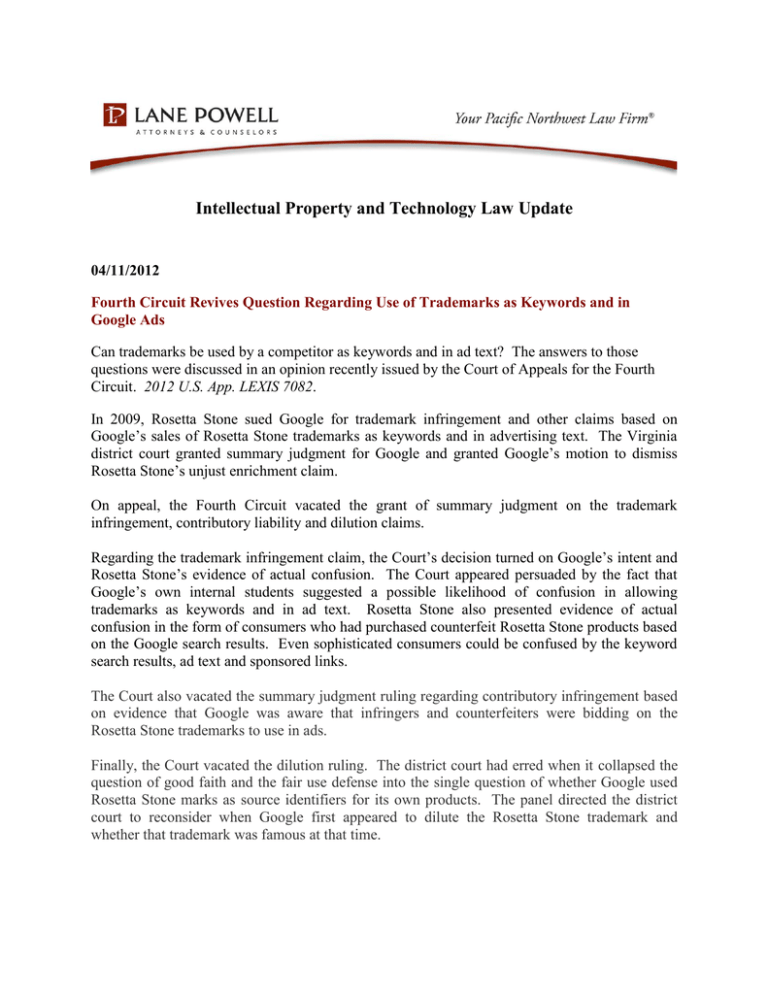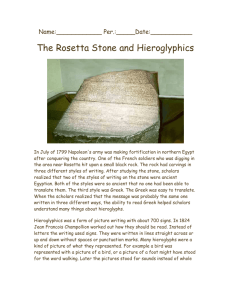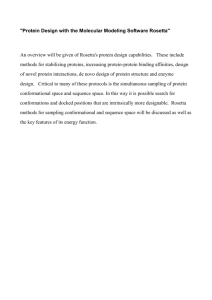Intellectual Property and Technology Law Update
advertisement

Intellectual Property and Technology Law Update 04/11/2012 Fourth Circuit Revives Question Regarding Use of Trademarks as Keywords and in Google Ads Can trademarks be used by a competitor as keywords and in ad text? The answers to those questions were discussed in an opinion recently issued by the Court of Appeals for the Fourth Circuit. 2012 U.S. App. LEXIS 7082. In 2009, Rosetta Stone sued Google for trademark infringement and other claims based on Google’s sales of Rosetta Stone trademarks as keywords and in advertising text. The Virginia district court granted summary judgment for Google and granted Google’s motion to dismiss Rosetta Stone’s unjust enrichment claim. On appeal, the Fourth Circuit vacated the grant of summary judgment on the trademark infringement, contributory liability and dilution claims. Regarding the trademark infringement claim, the Court’s decision turned on Google’s intent and Rosetta Stone’s evidence of actual confusion. The Court appeared persuaded by the fact that Google’s own internal students suggested a possible likelihood of confusion in allowing trademarks as keywords and in ad text. Rosetta Stone also presented evidence of actual confusion in the form of consumers who had purchased counterfeit Rosetta Stone products based on the Google search results. Even sophisticated consumers could be confused by the keyword search results, ad text and sponsored links. The Court also vacated the summary judgment ruling regarding contributory infringement based on evidence that Google was aware that infringers and counterfeiters were bidding on the Rosetta Stone trademarks to use in ads. Finally, the Court vacated the dilution ruling. The district court had erred when it collapsed the question of good faith and the fair use defense into the single question of whether Google used Rosetta Stone marks as source identifiers for its own products. The panel directed the district court to reconsider when Google first appeared to dilute the Rosetta Stone trademark and whether that trademark was famous at that time. While the Rosetta Stone decision suggests problematic uses of trademarks as keywords and in other advertising, the case may be limited to its facts. Other courts interpreting the decision are likely to hone in on the factors that appeared most important for the Fourth Circuit: intent and actual confusion. Nevertheless, keyword purchasers and online advertisers should be wary of using others’ trademarks in a manner that creates a known likelihood of confusion. For more information, please contact the Intellectual Property and Technology Practice Group at Lane Powell: IPGroup@lanepowell.com This is intended to be a source of general information, not an opinion or legal advice on any specific situation, and does not create an attorney-client relationship with our readers. If you would like more information regarding whether we may assist you in any particular matter, please contact one of our lawyers, using care not to provide us any confidential information until we have notified you in writing that there are no conflicts of interest and that we have agreed to represent you on the specific matter that is the subject of your inquiry. Copyright © 2012 Lane Powell PC Seattle | Portland | Anchorage | Olympia | Tacoma | London 2



